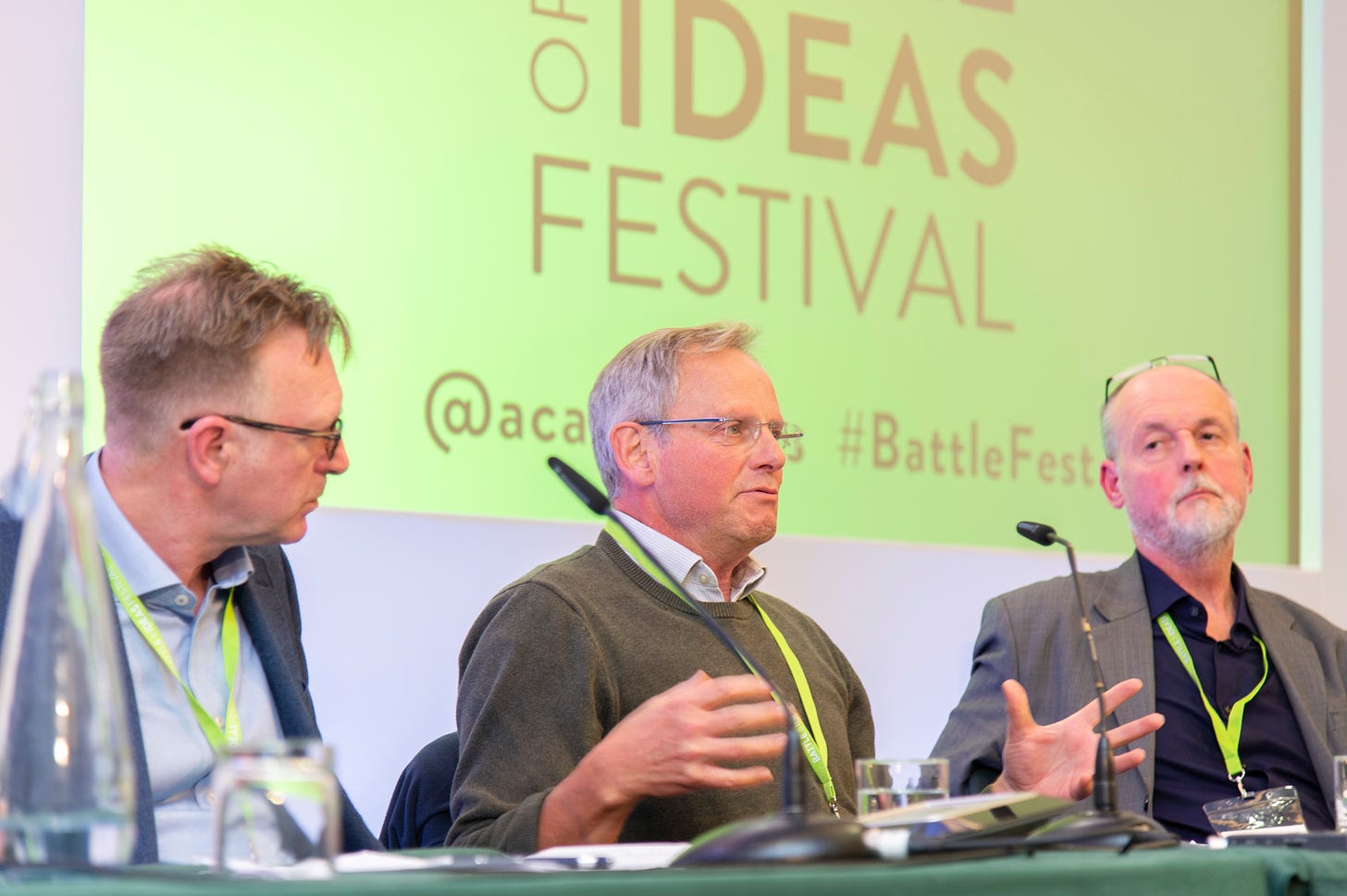What is 'the blob'?
Former diplomat Nick Busvine shares his speech from the Battle of Ideas festival 2023.
The Buxton Battle of Ideas festival, this coming Saturday, is a day of debate on politics, economics, philosophy and more at The Devonshire Dome. I believe that the current level and range of political debate is poor - and I know that many of you do, too. Time and again, the major parties tack back towards a narrow set of political options that leave the needs of millions of citizens unrepresented.
But what if the problem is not just our politicians but the groupthink of unelected and unaccountable civil servants, public-sector managers, planners and government more generally? Politicians and others have complained about the way these layers of government get in the way of change, and describe them - not in a complimentary way - as ‘The Blob’.
At our London festival we held a debate, What is the ‘Blob’?. One of the speakers, Nick Busvine, wrote up his introduction to the discussion and we reproduce it here.
If you think politics should be about more than the narrow worldview of The Blob, get your tickets for Buxton Battle of Ideas festival here.
What is the Blob?
Nick Busvine
The film The Blob offered us a vision of something invasive, glutinous, uniform, suffocating, all-encompassing and decidedly unpleasant. On the subject of SciFi, I’m tempted also to quote the Borg: ‘Resistance is futile.’
But seriously, for me, the key defining criteria for the Blob are public funding and accountability – or rather, the absence of accountability
If we judge that politicians have failed us, we can throw them out at elections.
But the Blob, I think, are those people who are paid by the taxpayer and who exert significant influence on public policy making, but who remain essentially anonymous and ‘out of reach’: in other words - civil servants, quangocrats, regulators, health service leaders and so on.
The backdrop to this debate is a palpable and growing sense of public concern that the outcomes of our public-policy process are, to be blunt, poor: policy and regulatory mistakes in the run-up to the global financial crisis, failure to properly weigh potential lockdown harms during Covid, failure to manage illegal immigration, NHS management failures behind the Lucy Letby child-murder scandal, Bank of England money printing and inflation, the mind-blowing costs to the taxpayer associated with HS2, effective planning and honesty around the transition to Net Zero – the list goes on and on. And, as countries the world over are now discovering, the ability to paper over poor decision making and policy cracks with dollops of debt-based funding is becoming dramatically more expensive and unaffordable
Government policy making is the product – in theory – of the interplay between elected politicians and their impartial officials. If Labour is elected next year, Blob competence will be of immediate and compelling concern for them.
I worry that changes in the culture of the civil service that began in the 1990s have seen a progressive decline in departmental effectiveness. Blob leaders these days may still think they are really good – but if judged on the basis of delivery, they look (with a few notable exceptions) either a bit ‘meh’ – or significantly worse
Civil service leaders continue to argue that they should not be held accountable, because that is not how our democratic system functions. But this only works if certain key conditions are fulfilled – and the key conditions are that the Blob is both impartial and effective. But is it impartial and effective? And what happens when things go wrong?
Remember too: it is publicly funded officials, not ministers, who are directly responsible for the culture, capability and delivery of their respective organisations.
However unsympathetic one might be for the politicians, it is hard to see why they should take all the blame for failing to deliver on their manifesto promises when they are up against entrenched hostility or unacceptable levels of incompetence from their own supposedly impartial officials and publicly funded bodies.
Here are some defining characteristics of the Blob, which I also think are undermining effectiveness:
The triumph of process over delivery
Process and proper planning are essential. But when process becomes a career-building end in itself, it becomes destructive. We now regularly see Blob leaders claiming equality, diversity and inclusion outcomes in place of core departmental delivery targets. This looks like costly and wasteful displacement activity. As one recently retired official told me last year: ‘If the unmeritocratic woke HR policy that my department is currently applying continues, the department as a whole will fail to deliver what taxpayers expect – and it will be wholly irrelevant in 10-15 years.’Groupthink
Those of us who served in Iraq are more keenly aware of the perils of groupthink than most. Despite having a bad name, it is still there. For all the talk of the importance of diversity, there is a tendency to self-select ‘people like us’ for leadership posts. The danger is that we end up with a uniform leadership group who all tick the same HR boxes and who all share the same outlook. This does not necessarily lead to good appointments – and undermines the internal challenge function essential to effective decision making.Loss of impartiality
We have seen multiple examples of civil servants gunning for Boris Johnson, Liz Truss and various other senior Cabinet ministers in recent years. On Brexit, most civil servants hated it and have not been shy about saying so. There is also a non-impartial political dimension to wokery – which has really embedded itself in the Blob. The truth of it is, I’m afraid, that identity politics and impartiality are not compatible.Disdain for democracy
Again, this has been brought to the fore by Brexit. Put simply, many in the Blob appear to be deeply suspicious of bottom-up democracy. Churchill’s dictum ‘trust the people’ seems to be anathema to many in our ruling class. Post-Brexit, we seem to be witnessing a determined campaign to shift as much executive power as possible away from politicians and into the hands of unaccountable technocrats and multilateral institutions, as well as the courts. Long experience of working overseas tells me that growing and unaccountable Blobs are not a good thing for democracy, freedom or prosperity.
What of the future?
Don’t touch our wonderful civil service and quangocrats, we are told. But Labour have effectively done it with the appointment of Sue Gray as Keir Starmer’s chief of staff. I’m sorry but, to me, Gray’s decision to flirt with Labour while writing the report that would bring down a Conservative PM makes an utter mockery of civil service impartiality. The concept to which I held true throughout my career has been buried by Labour – and we should not pretend otherwise.
Loss of impartiality sets up a countervailing requirement for accountability.
We can no longer avoid consideration of civil service reform. Former Cabinet Office minister Francis Maude is conducting a review – and it will be interesting to see what he recommends. But we badly need a more developed debate on the relationship and balance of power between our elected politicians and our unaccountable Blob.
Nick Busvine is an advisory board member of Briefings for Britain and has written regularly for the site, usually on issues related to Brexit and the Civil Service. Nick joined the Foreign and Commonwealth Office, serving as a diplomat in Malaysia, Syria, Mozambique, Colombia and Iraq as well as in London. Nick’s final posting was in Baghdad during the height of the war in Iraq (2006-07). Nick went into the private sector – and is now a founding partner of the London-based advisory firm Herminius. Nick was a town councillor in Sevenoaks 2012 – 2023, serving as mayor of Sevenoaks 2019-2021.
Join us at The Devonshire Dome, a stunning venue in the spa town of Buxton, in the heart of the Peak District in Derbyshire. The Buxton Battle of Ideas is an opportunity to get to grips with some major public debates and the challenges we face going forwards, covering politics, economics and our wider culture.
Produced by the Academy of Ideas with headline partner the University of Derby.





